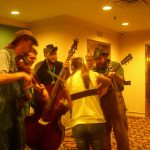To this point, we’ve heard 23 different stories of how people have broken into the sports industry, and no story is the same. We have come to the obvious realization that there is not one standard path to get in! These sports stories are among the most entertaining that I’ve heard on the trip. I have a newfound respect for the people persistent enough to stick with their pursuit, all for the thrill of working in the sports industry. Marty Maloney is one such person. He currently works for his hometown team, the World Champion Chicago White Sox. It seems that his honest approach would make any sports team take a chance on him.
 Marty grew up in Southside Chicago, where there is no talk of “the other team that plays baseball in Chicago.” It used to be the only place in the country that you could find people wearing White Sox gear, but with the organization’s newfound success, it seems that you can find a Sox pinstripe jersey just about anywhere; even in Wrigleyville. Such was the case when the PTP team attending a, dare I say it, Cubs game. As we approached the historic stadium, a rival fan drove by in a beat up ‘82 “whatever” chanting “White Sox.” It is this kind of passion that keeps the rivalry alive in Chicago.
Marty grew up in Southside Chicago, where there is no talk of “the other team that plays baseball in Chicago.” It used to be the only place in the country that you could find people wearing White Sox gear, but with the organization’s newfound success, it seems that you can find a Sox pinstripe jersey just about anywhere; even in Wrigleyville. Such was the case when the PTP team attending a, dare I say it, Cubs game. As we approached the historic stadium, a rival fan drove by in a beat up ‘82 “whatever” chanting “White Sox.” It is this kind of passion that keeps the rivalry alive in Chicago.
Marty grew up a Sox fan and always had a love for baseball. His road into sports began when he decided to attend the University of Arizona for his freshman year. There he worked alongside Jim Rosborough, the assistant to head basketball coach Lute Olson (see Lute Olson interview). Marty took stats from the beloved and highly sought after Wildcats bench. Unable to grow accustomed to the triple digit temperatures in the desert, he soon found himself homesick. He decided to return to the Midwest and found a new and more comfortable home at the University of Iowa.
Marty wanted to get involved with Iowa sports, just as he had in Tucson,. He phoned the athletic department repeatedly with no results. Looking for an alternate route, he visited the offices every so often to see if there was any way that he could contribute to the program. Now a senior, he finally got his chance after two years of persistence. A position was created for him where he could write stories about the games as well as take stats for the basketball team.
After he graduated, he began to look for jobs and internships in sports. He landed a phone interview for a year-long internship with the NBA’s Orlando Magic organization, which had the worst league record at the time (21-61). Marty decided that he was going to make the most of his internship, looking at it as a fifth year of schooling. I mean, who wouldn’t want to get their Master’s with an NBA team? He felt that he learned more with Magic than he did at the university level. His focus became “off-the-court relations” because management wanted to overt attention away from the Magic’s poor on the court performance.
 The downside of a year-long internship is that it ends. So Marty found himself moving back to Chicago where he accepted a, marketing position with a food company. At that same time, the Sox were having a year that every baseball franchise dreams about having. They were setting attendance records and working their way through the playoffs. With the team’s every accomplishment Marty sent an e-mail to executives congratulating them on their success. After they won the World Series he sent them a hand written note, part of his philosophy of“always staying in front of people.”
The downside of a year-long internship is that it ends. So Marty found himself moving back to Chicago where he accepted a, marketing position with a food company. At that same time, the Sox were having a year that every baseball franchise dreams about having. They were setting attendance records and working their way through the playoffs. With the team’s every accomplishment Marty sent an e-mail to executives congratulating them on their success. After they won the World Series he sent them a hand written note, part of his philosophy of“always staying in front of people.”
So, when a job posting appeared on the PR Society of Chicago with an opening for the Chicago White Sox, it was Marty’s philosophy that put him a step ahead of his competition. The Thursday before Opening Day this year in 2006, he had his first interview with the team for the available Public Relations Coordinator position. On May 8th, over a month later, he started a job with his hometown team. Marty speaks of May 8th as if it were a day that should be ever remembered in infamy.
His position with the White Sox, much like it was with the Orlando Magic, is focused on the off the field coverage. In only three months with the organization, Marty has already coordinated events like Habitat for Humanity for Hurricane Katrina, in which players like Jim Thome and Paul Konerko built a home for a family, and Miracle Field, a baseball field built in the southwest side of Chicago for children with special needs. He admits that there are perks to his line of work. You can find Marty Maloney in the press box during Sox games rooting on his team/employer/product in a professional/fan-like manner. He also admits that the staff that he works with makes his job so much easier. Among this group is the well respected vice president of communications, Scott Reifert.
Additional advice that Marty had for students was something that he learned while with the Orlando Magic. It consisted of the classic question that you hear in interviews, not the one about strengths and weaknesses, but the one which asks “Where do you see yourself in five or ten years?”
Marty learned that you should never want to be “here” in five years or “there” in ten. “If you’re the coordinator of public relations, you shouldn’t say that you’ll be the manager in five. It will all take care of itself in the long run.”
Also, Marty added additional advice that is something that we’ve heard quite frequently on the trip. This certain something goes by the name of, writing!
“I didn’t have the best writing skills, I was a marketing guy in school. But you’ll write in any field you go into. Even in finance you’ll have to write memos and emails. You can become a better writer by reading any kind of material.”
Interview
I grew up on the southside. This was my team growing up.
This is always where I wanted to work. I tried to stay in front of these guys. Last year they set attendance records. I met the director of marketing one day at lunch and whenever they would reach an attendance record milestone, I would just send him an email to congratulate him.
It couldn’t be a better situation for me and growing up on the southside. To work for a baseball team is unbelievable, but to do it for your hometown team is unbelievable. Absolutely amazing.
I certainly don’t think you need to be a fan to enjoy the job.
Not only am I fortunate in that I work for the hometown team, but anyone in the industry just raves about our department. Katie Curvey has an believable reputation. Scott Reifert, my boss’s boss, is our VP of Communications. From a professional growth standpoint, I’m in a really good situation to learn.
I started almost three months to the day. May 8th. I interviewed the Thursday before Opening Day.
Just two interviews.
So we at media relations, or public relations, we’re in the same office but do different things. Media relations takes care of the baseball stuff. The stats, anything that is directly related to baseball. The interview requests, for the most part. They take care of anything that will be in the sports pages essentially.
Our department, public relations, is off the field. The non-traditional stuff, ideally off the sports pages. My second day we did a build for Habitat for Humanity across the street. Jim Thome and Posednik and Konerko were there. So we had a ton of media. That’s something that would be in our area.
Katie, my boss, is essentially in charge of the PR strategy, and the pitches. What I essentially do is I came to help her out. What I do is more task driven, I guess. I do a lot of writing for her. I do the releases for some stuff.
We also have a community relations newsletter that goes out to our season ticket holders. And we have an alumni newsletter that goes out to our former players. I play a big role in those as well.
I track our coverage. I put together monthly reports about where we got coverage. Highlights on SportsCenter don’t count for our reports.
You said your department is well known throughout the industry.
When I applied for the job, there was this sports editor for the Chicago Tribune I met. And another family friend is a writer for a sports publication. They both said that Katie Curby was the best. They just said she’s great at her job. She knows what’s important to them and knows how to deliver the message.
Ozzie made some ill advised comments earlier in the year. When its something that big, it goes to the head of our communications. He handles everything in stride.
Advice to get in sports.
Stay in front of people.
There’s no standard path.
You’ll never hear me complain about my position. I’m the envy of all my friends. But at the same time, our salary differences are pretty big. It comes with the territory. It’s the thrill factor. You pay for it, I guess.
I don’t have a lot of game day responsibilities because I’m not involved with the baseball side. But I sit in the press box for games. I go to the majority of the games. I try to help out our media relations interns because they’re really busy. And especially because it’s my first season. I want to be around as much as possible. I try to help out and get a quote from the opposing coach. I do whatever I can to chip in, even if it’s running a credential downstairs.
I probably would be watching the game at home anyways, so I might as well be sitting in the press box. I’m here most of the time. I don’t have to be here every game, but I try to be here as much as possible.
My boss said the ramp up would take six to eight months for me to get a feel for things. Every week that goes by I get more and more comfortable. And I’ve only been here for three months. I think I’ll get the hang of the strategy stuff more as we go along. With winning the World Series last year, I think it’s a few more challenges but more opportunities than anything.
Our popularity has never been this high in the city and nationwide. So for the first time in a long time, we’re up there with everyone.
There was this big article in the paper last Friday about how White Sox merchandise sales and ratings were closing in on the Cubs. So we don’t consider the Cubs our main competitor. There are a lot of entertainment options in Chicago besides Wrigley Field. There’s plays, Navy Pier, all that stuff.
We have to appeal to a mass audience, not just baseball fans.
Best experiences here.
As exciting as it is, you have to maintain professionalism about it. You don’t want to get caught jumping up and down or asking for autographs or anything. My second day, looking back, it was really cool doing that Habitat for Humanity. We built that house for victims of Katrina who lost their home and moved up here. Just to see the family that was moving in there was really exciting. And that’s the type of stuff we’ll deal with.
The best day was building a ‘Miracle Field’ out in the southwest side. It’s right next to where I grew up and where my parents still live in Mount Greenmount Park. It’s for special needs kids. The first time going out there as an employee of the Sox, it was cool to see all these neighbors proud of what was going in their neighborhood. And to go back as a member of the White Sox as opposed to doing it as a fan was pretty unique.
I’ve only been here three months. They said they want someone for awhile. This is where I want to live. This is where my family is. Ideally, I’ll be here…I hope I never leave. It’s a little early to say that three months in. But I’d like to think that.
I’m a coordinator. If I’m a coordinator, I don’t want to say that I’ll be a manager in five years. I agree with that philosophy. That’s outside of my hands, in a sense. If I do the best job I can every day, promotions, bonuses, those will take care of themselves in the long run. It might sound corny.
I never said I want to be making this much when I’m 25, 30. I’m happy with where I’m at now. I think as long as I do my job, and do it well, and they’ll accommodate me.
Dream come true. Hometown team.
The main thing is to not get caught up. Once you’re employed, everyone is a fan.
I didn’t have a strong writing background. I was in marketing. I wrote on the side. If I didn’t do that, this opportunity wouldn’t have presented itself.
I read our game notes in the paper and the websites.






